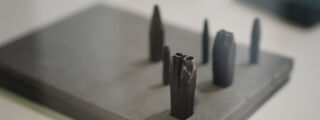'Small performances' is an interdisciplinary project that will make a substantial contribution to the history of printing technology, whilst ensuring it is a living process that will continue into the future. At its heart is the exceptional collection of typographic punches designed, cut, and used at the Birmingham workshop of England's foremost printer, John Baskerville (1707-75), and now housed in the Historical Printing Room, Cambridge University Library. Bringing together printing historians, heritage scientists, craftspeople, and type designers around the AHRC-funded Cambridge Heritage Science Hub (CHERISH), this project will reconstruct eighteenth-century punch-cutting using a combination of pioneering scientific and artisanal methods that will benefit current industrial and craft applications as well as educational projects.
Project aims
- Clarifying the corpus and re-housing the collection: we will produce a detailed assessment and inventory of the 2,700+ punches.
- Reverse engineering the craft of 18th-century punch-cutting: through a combination of pioneering scientific analysis of the punches using methods borrowed from heritage science, engineering and archaeology, and experimental replications.
- Revealing Baskerville's typographic intent: employing forensic and engineering approaches, we will evaluate the loss of design fidelity which occurs between the manufacture of the punch and the character that appears on the printed page.
- Developing impact in the present: we will contribute to the preservation of traditional craft skills through imaginative approaches to their adaptation and use in the present.
- Contribute to the preservation, digitisation, and study of heritage collections and associated craft skills, in keeping with our responsibilities towards future generations.
- Boost the current resurgence of interest in analogue and hands-on forms of communication and making, as human-scale processes that counteract fast living and dwindling interest in how things are produced.
- Explore the potential of novel interactions amalgamating research and impact, and engaging academics, practitioners and laypeople.
Impacts
The project will materialise as a new and essential chapter in the history of world technology, and as a novel form of research engagement among academics, practitioners, and laypeople, made visible through 3D models, digital editions, new typeface designs, and practical and creative workshops. This work will transform our understanding of the collection of Baskerville punches and benefit current industrial and craft applications, as well as educational projects.
Recently, digital humanities and craft revival have prompted a resurgence of interest in analogue forms of communication and the technologies that enabled them. Letterpress, and the allied craft of punch cutting, for centuries the dominant printing process, is now commercially obsolete but has been given a new lease of life through small-press imprints that use redundant letterpress equipment. An endangered craft on the Heritage Craft Association's Red List, letterpress faces an uncertain future. Its preservation requires documentation and practice but also imaginative approaches to their adaptation and use in the present. "Small performances' will be a step in that direction.
Project Team
- Prof Caroline Archer-Parré, Centre for Printing History & Culture (BCU)
- Dr Ann-Marie Carey, School of Jewellery (BCU)
- Prof Marcos Martinón-Torres, Department of Archaeology, University of Cambridge
- Mr Maciej Pawlikowski, Cultural Heritage Imaging Laboratory, Cambridge University Library
Researchers
- Dr Julia Montes-Landa, Department of Archaeology, University of Cambridge
- Mr Liam Sims, Cambridge University Library
Technical Support
- Keith Adcock, School of Jewellery (BCU)
- Mark Box, Cultural Heritage Imaging Laboratory, Cambridge University Library
- Paul Evans, School of Jewellery (BCU)
- Anastasia Young School of Jewellery (BCU)
Consultants
- Riccardo Olocco, Independent typeface designer, Italy
- Michele Patanè, Independent typeface designer, UK
Funder
Arts & Humanities Research Council (AHRC)
